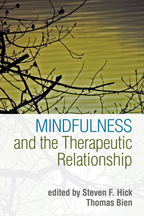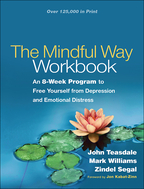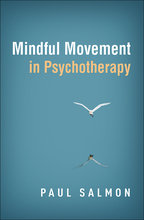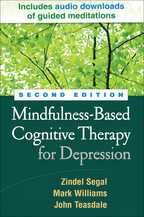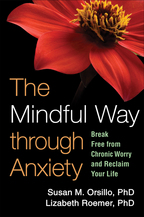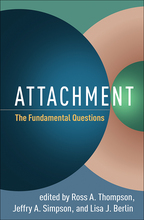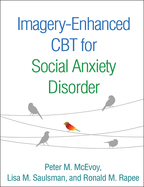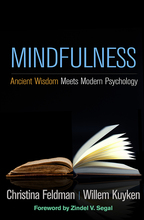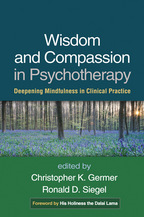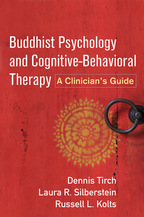Mindfulness and the Therapeutic Relationship
Edited by Steven F. Hick and Thomas Bien
Foreword by Zindel Segal
Paperbacke-bookprint + e-book
Paperback
orderJuly 21, 2010
ISBN 9781609180195
Price: $37.00240 Pages
Size: 6" x 9"
Copyright Date: 2008
Sign up for emails on upcoming titles on Mindfulness (with special discounts)!
“The book's interest lies not in the gradual unfolding of a complex line of argument but rather in an exploration of how these fairly straightforward propositions might play out in the hands of experienced and creative therapists, working in different contexts and with differing models of psychotherapy....I enjoyed this book....Fascinating, with much food for thought. The authors and editors have illuminated an area ripe for investigation and one that richly deserves research, as they almost universally recognize.”

—Journal of Behavioural and Cognitive Psychotherapy
“This may come to be seen as a groundbreaking text. In it, contributions from the fields of psychology, addictions, family therapy, and social work highlight the primary, integrative role that the authors believe mindfulness plays in the development of the therapeutic relationship and, thus, in the efficacy of therapy....I found the book powerful....I hope social work will thoughtfully consider the value and place of a practice as potentially radical as mindfulness. Hick and Bien do a great service in laying the foundation for that exploration.”

—Social Service Review
“Represents an important addition to the literature on including mindfulness principles in Western psychological practice....The book effectively integrates Buddhist theory with Western psychological concepts. It also establishes that other practices, such as compassion and loving-kindness meditations, may be of future interest to Western researchers....The authors effectively establish their position that mindfulness practice may greatly enhance and deepen the relationship between therapist and client, therefore likely improving upon treatment outcomes.”

—Journal of Psychosomatic Research
“This book provides direction for the application of and research on the use of mindfulness in clinical care....The authors' focus on the relationship between client and clinician spirituality is an important new direction for the literature....This book would be a nice addition to anyone's professional library who is interested in using spiritual practices to inform the provision of clinical care.”

—Journal of Contemporary Social Services
“Mindfulness and the Therapeutic Relationship serves us well as a required book in the Adult Psychotherapy concentration at the doctoral level. We teach and practice mindfulness at this level because it fosters presence, attention, and empathy in therapy, and also supports students' well-being as they go through graduate school. The book anchors the practice, illuminates it with theoretical understanding, and fosters cognitive flexibility. The topic and multiple viewpoints fit the needs of the class, and at an affordable price, too.”

—Alex Suarez, PhD, Core Faculty, School of Applied Psychology, Counseling and Family Therapy, Antioch University Seattle
“Mindfulness is not an esoteric topic relevant only to a few therapists—it is a process that profoundly changes how we think about the nature and goals of therapeutic work itself. No recent book shows that more than this one, which illuminates the social nature of consciousness and carefully lays out the implications of mindfulness for compassion, connection, and relationship. We have long known that a powerful therapeutic relationship is a key to success in therapy. This book begins to show how we can use ancient wisdom to cultivate that relationship.”

—Steven C. Hayes, PhD, Foundation Professor of Psychology Emeritus, University of Nevada, Reno; originator and co-developer of Acceptance and Commitment Therapy
“Mindfulness and psychotherapy have quite naturally found each other in ways that allow both patients and therapists to reap the benefits of embedding awareness practices within a traditional therapeutic frame. In this important volume, Steven Hick, Thomas Bien, and their contributors embark on a much-needed discussion of the contours of this emerging synthesis, through a multifaceted examination of the connection between the therapeutic relationship and mindfulness practice....The beauty of this book is that it allows the reader to look at the space between these two sources and see how a bridge between them, perhaps a trestle at first, is starting to be built.”

—from the Foreword by Zindel Segal, PhD, Distinguished Professor of Psychology in Mood Disorders, University of Toronto–Scarborough, Canada
“This fascinating, clinically fertile, and wide-ranging work illuminates and interweaves what may well be the two most significant themes in contemporary psychotherapy: the 'discovery' that therapy is a process of transformation through relationship and the introduction into clinical work of a 2500-year-old tradition of mindful awareness. Exactly how these developments may be integrated is the question addressed by the contributors to this scholarly yet accessible volume. Their responses are by turns practical, thought provoking, and inspiring. Mindfulness and the Therapeutic Relationship will doubtless prove a valued resource for novice and seasoned clinicians alike.”

—David J. Wallin, PhD, private practice, Mill Valley and Albany, California
“Hick and Bien present a timely discussion at the intersection of two topics that have recently captured much-deserved attention in the psychotherapy field. Leading scholars from diverse orientations address mindfulness and the therapeutic relationship with regard to issues of definition, measurement, treatment, and training. The result is a significant contribution to the literature—one that will be greatly appreciated by clinical practitioners, researchers, graduate students, and instructors.”

—J. Christopher Muran, PhD, Derner Institute of Advanced Psychological Studies, Adelphi University, and Psychotherapy Research Program, Beth Israel Medical Center
—Journal of Behavioural and Cognitive Psychotherapy
“This may come to be seen as a groundbreaking text. In it, contributions from the fields of psychology, addictions, family therapy, and social work highlight the primary, integrative role that the authors believe mindfulness plays in the development of the therapeutic relationship and, thus, in the efficacy of therapy....I found the book powerful....I hope social work will thoughtfully consider the value and place of a practice as potentially radical as mindfulness. Hick and Bien do a great service in laying the foundation for that exploration.”
—Social Service Review
“Represents an important addition to the literature on including mindfulness principles in Western psychological practice....The book effectively integrates Buddhist theory with Western psychological concepts. It also establishes that other practices, such as compassion and loving-kindness meditations, may be of future interest to Western researchers....The authors effectively establish their position that mindfulness practice may greatly enhance and deepen the relationship between therapist and client, therefore likely improving upon treatment outcomes.”
—Journal of Psychosomatic Research
“This book provides direction for the application of and research on the use of mindfulness in clinical care....The authors' focus on the relationship between client and clinician spirituality is an important new direction for the literature....This book would be a nice addition to anyone's professional library who is interested in using spiritual practices to inform the provision of clinical care.”
—Journal of Contemporary Social Services
“Mindfulness and the Therapeutic Relationship serves us well as a required book in the Adult Psychotherapy concentration at the doctoral level. We teach and practice mindfulness at this level because it fosters presence, attention, and empathy in therapy, and also supports students' well-being as they go through graduate school. The book anchors the practice, illuminates it with theoretical understanding, and fosters cognitive flexibility. The topic and multiple viewpoints fit the needs of the class, and at an affordable price, too.”
—Alex Suarez, PhD, Core Faculty, School of Applied Psychology, Counseling and Family Therapy, Antioch University Seattle
“Mindfulness is not an esoteric topic relevant only to a few therapists—it is a process that profoundly changes how we think about the nature and goals of therapeutic work itself. No recent book shows that more than this one, which illuminates the social nature of consciousness and carefully lays out the implications of mindfulness for compassion, connection, and relationship. We have long known that a powerful therapeutic relationship is a key to success in therapy. This book begins to show how we can use ancient wisdom to cultivate that relationship.”
—Steven C. Hayes, PhD, Foundation Professor of Psychology Emeritus, University of Nevada, Reno; originator and co-developer of Acceptance and Commitment Therapy
“Mindfulness and psychotherapy have quite naturally found each other in ways that allow both patients and therapists to reap the benefits of embedding awareness practices within a traditional therapeutic frame. In this important volume, Steven Hick, Thomas Bien, and their contributors embark on a much-needed discussion of the contours of this emerging synthesis, through a multifaceted examination of the connection between the therapeutic relationship and mindfulness practice....The beauty of this book is that it allows the reader to look at the space between these two sources and see how a bridge between them, perhaps a trestle at first, is starting to be built.”
—from the Foreword by Zindel Segal, PhD, Distinguished Professor of Psychology in Mood Disorders, University of Toronto–Scarborough, Canada
“This fascinating, clinically fertile, and wide-ranging work illuminates and interweaves what may well be the two most significant themes in contemporary psychotherapy: the 'discovery' that therapy is a process of transformation through relationship and the introduction into clinical work of a 2500-year-old tradition of mindful awareness. Exactly how these developments may be integrated is the question addressed by the contributors to this scholarly yet accessible volume. Their responses are by turns practical, thought provoking, and inspiring. Mindfulness and the Therapeutic Relationship will doubtless prove a valued resource for novice and seasoned clinicians alike.”
—David J. Wallin, PhD, private practice, Mill Valley and Albany, California
“Hick and Bien present a timely discussion at the intersection of two topics that have recently captured much-deserved attention in the psychotherapy field. Leading scholars from diverse orientations address mindfulness and the therapeutic relationship with regard to issues of definition, measurement, treatment, and training. The result is a significant contribution to the literature—one that will be greatly appreciated by clinical practitioners, researchers, graduate students, and instructors.”
—J. Christopher Muran, PhD, Derner Institute of Advanced Psychological Studies, Adelphi University, and Psychotherapy Research Program, Beth Israel Medical Center

